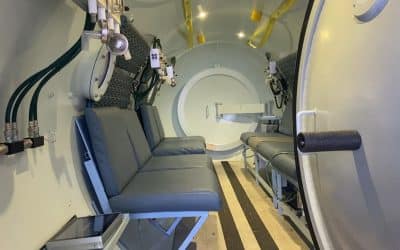The Front Line COVID-19 Critical Care Alliance recently released a hyperbaric webinar featuring special guests Dr. Fogarty, Dr. Meyer and Dr. Harch, as they discussed HBOT in Long-Haul and Post-Vaccine Injuries. Watch:...
Uncategorized
Hyperbaric oxygen therapy helps treat opioid addiction
SPOKANE, Wash.—Hyperbaric oxygen therapy may help people being treated for opioid addiction reduce their methadone dose and better manage pain and withdrawal symptoms, according to a pair of studies led by Washington State University scientists. The research team...
What is Crohn’s Disesase?
Crohn’s disease is an inflammatory bowel disease (IBD). It causes inflammation of your digestive tract, which can lead to abdominal pain, severe diarrhea, fatigue, weight loss and malnutrition. Inflammation caused by Crohn’s disease can involve different areas of the digestive tract in different people.
The inflammation caused by Crohn’s disease often spreads deep into the layers of affected bowel tissue. Crohn’s disease can be both painful and debilitating, and sometimes may lead to life-threatening complications.
While there’s no known cure for Crohn’s disease, therapies can greatly reduce its signs and symptoms and even bring about long-term remission. With treatment, many people with Crohn’s disease are able to function well.
What is Ulcerative Colitis?
Ulcerative colitis (UL-sur-uh-tiv koe-LIE-tis) is an inflammatory bowel disease (IBD) that causes long-lasting inflammation and ulcers (sores) in your digestive tract. Ulcerative colitis affects the innermost lining of your large intestine (colon) and rectum. Symptoms usually develop over time, rather than suddenly.
Ulcerative colitis can be debilitating and can sometimes lead to life-threatening complications. While it has no known cure, treatment can greatly reduce signs and symptoms of the disease and even bring about long-term remission.
Understanding Ulcerative Colitis vs Crohn’s Disease
Ulcerative colitis vs. Crohn’s disease
Both ulcerative colitis and Crohn’s disease are inflammatory bowel diseases (IBDs), but there are some key differences.
Ulcerative colitis:
Limited to the large intestine (colon and rectum)
Acute Concussion Diagnostics and Treatment
16 year old lacrosse player took a “shot to the head”. He stopped practice immediately and within an hour his head was “really bothering him”, and “just didn’t feel right”. He wore his sunglasses to the pediatrician the new morning with a headache that was a 7 out of 10. Plus he had mental fogginess. He had an upcoming AP History test, but was not able to study. Treated him Friday midday (less than 48 hours). Treated Monday morning – symptoms resolved, he was able to study Monday Afternoon.
Interventions for treating acute high altitude illness.
Abstract: Acute high altitude illness is defined as a group of cerebral and pulmonary syndromes that can occur during travel to high altitudes. It is more common above 2500 metres, but can be seen at lower elevations, especially in susceptible people. Acute high...
Management of Radiation Proctitis.
Abstract: Radiation proctitis is radiation-induced rectal mucositis, occurring as a result of radiation therapy for various pelvic malignancies. The management of radiation proctitis is challenging as guidelines are not currently available, and studies of the various...
Hyperbaric oxygen therapy for digital ulcers due to Raynaud’s disease.
Abstract: We present a case of Raynaud's disease with digital ulcers that was successfully treated with hyperbaric oxygen therapy. Hyperbaric oxygen therapy can be considered as a safe and useful adjunct treatment for intractable digital ulcers in patients with...






